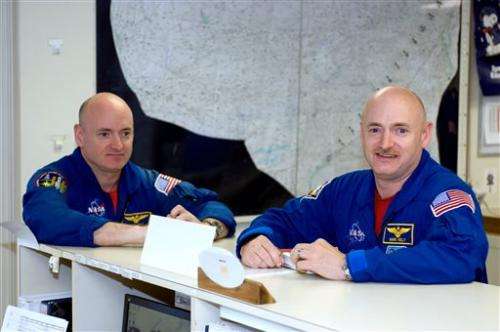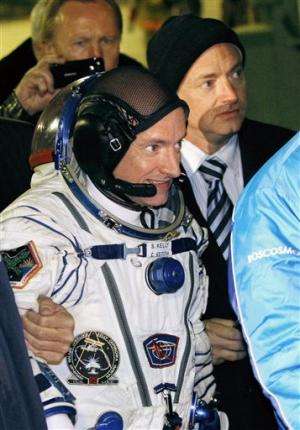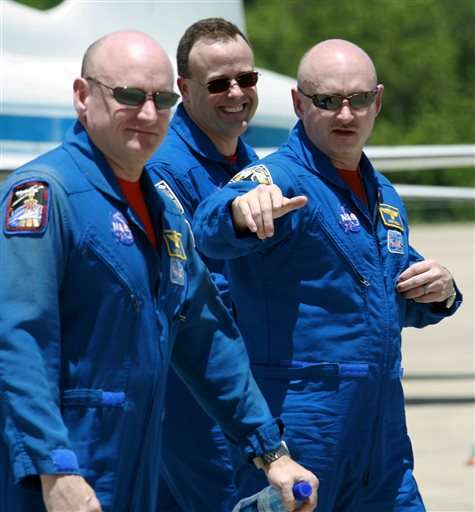Identical twins offer up selves for space science

Astronauts Scott and Mark Kelly will take part in an unprecedented study of identical twins to better understand the effects of prolonged weightlessness by comparing the twin in space with the twin on the ground.
When Scott Kelly embarks on a one-year space station stint next spring, his twin brother and retired astronaut Mark Kelly will be joining in from Earth, undergoing medical testing before, during and after his brother's American-record-setting flight.
Mark Kelly draws the line, though, at mimicking his brother's extreme exercise in orbit or eating "crappy space station food."
This is the genetic double of the 50-year-old astronaut who has volunteered to spend an entire year aboard the International Space Station beginning next March, along with Russian cosmonaut Mikhail Kornienko, 54, a former paratrooper.
No American has come close to a year; seven months is NASA's maximum for a single human mission. The Russians, on the other hand, are old hands at long-duration spaceflight, claiming title to a record-setting 14½-month mission back in 1994-95.
"No second thoughts—I'm actually getting kind of excited about the whole idea as we get closer," Scott said in a recent interview with The Associated Press.
Scott knows what he's getting into: He spent five months on the orbiting lab in 2010-2011. He began counting down the days on Twitter in late March.
Eager to explore new medical territory, Scott offered to have a pressure sensor drilled into his skull to study the impaired vision experienced by some long-term space fliers.

He's also volunteered for spinal taps in orbit. He'll share quarters at one point, after all, with an emergency medical doctor-turned-NASA-astronaut. The space station crew typically numbers six.
"As a test pilot, I like to push the envelope on things and, in this case, I feel like I'm maybe trying to push the envelope on data collection as well," explained Scott, a retired Navy captain.
But NASA scientists insist there's no compelling need for implants and spinal taps. They admire his gung-ho attitude, though, and marvel at their good fortune in having a set of identical twins for comparison.
The Kellys represent a scientific gift, said Craig Kundrot, deputy chief scientist for the human research program at NASA's Johnson Space Center in Houston.
"Not only are they the same genetically, but one is an astronaut, one's a retired astronaut. So they've followed very similar career paths. After Scott's mission is done, he'll have 540 days of spaceflight (in four missions). Mark will have 54. So exactly a 10-fold difference," Kundrot said.
"That's just an uncanny opportunity that we're taking advantage of."
NASA has selected 10 proposals for the twin study, involving the immune system, gut bacteria, reaction time, fluid shift in space and its potential connection to visual impairment, DNA and RNA molecular science, hardening of the arteries, among others. The researchers will receive a combined $1.5 million from NASA over three years.
A Stanford University sleep specialist and immunologist, Dr. Emmanuel Mignot, wants to give each brother a standard flu shot before, during and after the one-year mission. Blood draws will highlight any differences between the space twin and ground twin, and help researchers better understand changes to the body's immunity in weightlessness.

"No one really knows what happens to the immune system in space for a long period of time and, sooner or later, people are going to need to confront this issue," Mignot said
That's the whole point of Kelly and Kornienko's one-year mission: to identify physical challenges that need to be overcome before astronauts venture to Mars and beyond.
The pair will launch from Kazahkstan aboard a Russian rocket and return via a Russian capsule. Midway through their mission, they'll have a real change of pace.
English soprano Sarah Brightman—perhaps best known for her starring role on stage in "The Phantom of the Opera"—intends to fly up as a paying passenger in a private deal with the Russians.
"It would be hard to beat her" for breaking the monotony of space, said Scott, a longtime fan of the singer.
Mark, also a retired Navy captain with two daughters, is married to former congresswoman Gabrielle Giffords, who survived a 2011 assassination attempt —while Scott was on the space station. Mark commanded NASA's next-to-last shuttle flight four months after the shooting, then left NASA. They live in Tucson, Arizona.
© 2014 The Associated Press. All rights reserved.




















